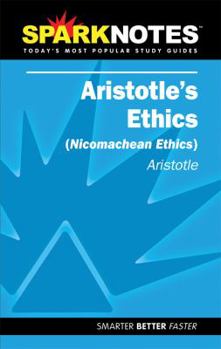Spark Notes Aristotle's Ethics (SparkNotes Literature Guides)
Select Format
Select Condition 
Book Overview
Enduringly profound treatise, whose lasting effect on Western philosophy continues to resonate. Aristotle identifies the goal of life as happiness and discusses its attainment through the... This description may be from another edition of this product.
Format:Paperback
Language:English
ISBN:158663822X
ISBN13:9781586638221
Release Date:June 2003
Publisher:Sparknotes
Length:66 Pages
Weight:0.23 lbs.
Dimensions:0.2" x 5.3" x 8.3"
Related Subjects
Ancient & Classical Literature Education Education & Reference Education & Training Ethics & Morality Greek Literary Criticism Literary Criticism & Collections Medieval Movements & Periods Philosophy Politics & Social Sciences Study Study & Teaching Study Aids Study Skills Studying & WorkbooksCustomer Reviews
3 ratings
Rigorous, clear and still relevant
Published by Thriftbooks.com User , 24 years ago
Along with many other virtues, Aristotle has the characteristic of being extremely systematic and ordered in his exposition of subjects. It is believed that he, like Plato, wrote dialogues to illuminate his philosophy, and that those dialogues are lost and all we have is his notes for class. It is good we still keep so many notes, because of its said order and clarity. Of course, it is not an easy reading (although I wouldn't put him either among the obscure and dark philosophers). It is rigorous philosophy exposed without useless digressions.Aristotle tells us that all extremes are bad. We have to find the "golden middle". Then he proceeds to expose different sets of extremes and the virtuous middle of the road. Being mad with fury is bad, but being insensible to outrageous actions is also a measure of inhumanity and extreme weakness of character. And so with the other virtues and vices. Aristotle's system is still relevant because of the simple fact that he treats features of the human soul that are universal, regardless of time and place. His theories do not come from Divine revelation or from any mystical source. They come from common sense, and an acute observation of the humankind. Aristotle tells us that we must moderate our primal impulses and instincts, and live by the rule of reason and reasonability. No wonder Aristotle is the source of rigorous, systematic and realist Western philosophy, as opposed to the more literary, poetic and idealist school that comes from Plato, Aristotle's mentor. His is an almost scientific approach, certainly not "entertainment" or Tarot philosophy. It needs no recommendation; it has proved to be a universal work of the mind, one that will stay extant through the ages, as it has already been. Anyone interested in serious philosophy reads this at some point, hopefully an early one. It is of great help when trying to elucidate what is good and what is bad; when trying to figure out if there is a light to guide our behavior and attitude towards the world and our fellow humans. Follow the golden middle and you will eventually find a sense to everyday life, if not to the more torturing reflections on Being. For this last task, read the rest of Aristotle's work, especially the Metaphysics (which have absolutely nothing to do with what cheap deceivers know these days as metaphysics). This is rigorous philosophy, not courses on "excellence" and self-promotion.
The Art of Living
Published by Thriftbooks.com User , 24 years ago
"Every art or applied science and every systematic investigation, and similarly every action and choice, seem to aim at some good; the good, therefore, has been well defined as that which all things aim." In his Ethics, Aristotle does little more than to search for and examine the "good." Aristotle examines the virtues and vices of man in all of his faculties. Aristotle refers to three types of lives, the common life, the political life, and the contemplative life, to which he assigns the highest order. Certainly, this is the most difficult life. Similar to Plato, Aristotle believed that "the unexamined life is a life not worth living." Aristotle does nothing other to examine the life of man and what is the best life to live.Unlike Plato, you do not need to read the entire work to walk away with some useful insight into life. Though the over 100 chapters, divided into ten books, flow and build upon each other, you can read just one of them and be benefited. Aristotle covers many different subjects such as the good, morals, virtue, vice, courage, generosity, justice, intelligence, art, science, friendship, love, pleasure, and pain. I can not say enough for the depth of insight Aristotle has into living the good life. Nicomachean Ethics is well written and presented in a clear manner that should be accessible to most readers. This is a must read for everyone.
The Book that Created Ethics; Don't Miss It!
Published by Thriftbooks.com User , 27 years ago
The Nicomachean Ethics is the first systematic description of an ethical system. It has the clearest formulation of the questions that Ethics asks: 1. How should we live? 2. Why? 3. Why is that best? Aristotle's answer to 1. is that we should avoid extremes, because (answering 2.) every extreme is evil, and (answering 3.) since the opposite of any extreme is itself an evil extreme, we must therefore avoid extremes. The book has been read by every serious ethical philosopher since history began. Because of this, every serious ethical work can (and should) be read as a dialogue with Aristotle, as he sets the rules, and then challenges, "I know of no good that crosses all the categories . . . but in each category there is one particular good." Kant's Foundations of the Metaphysics of Morals is an attempt to find a normative good that crosses all categories, a "categorical imperative." Likewise Bentham's discussion of what has come to be called utilitarian ethics. Really, a most important book.





